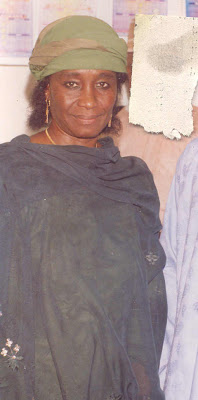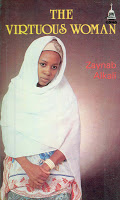Literature

- My Pen Is That Faceless Crusader Aiming For A Change - Salamatu Sule
SALAMATU SULE, a graduate of English and Literary Studies from the Kogi State University, Ayingba, is a multi-talented writer. She writes prose and poetry in both standard and Pidgin English. In this interview with SUMAILA UMAISHA, the imaginative writer,...
- I Have A Blueprint For Ana Renaissance - Professor Umelo Ojinmah
Professor Umelo Ojinmah, Dean of the Faculty of Arts, Nasarawa State University, Keffi, speaks with Sumaila Umaisha on his ambition to lead the Association of Nigerian Authors, ANA, saying he has prepapared a blueprint for the a renaissance in the association. ...
- I Have Books That Are Yet To Be Published - Binta (interview)
Binta S. Mohammed, who passed on 4th May, 2009, is a notable poet and novelist and a lecturer in the Department of English at Bayero University, Kano. She had an interesting interview session with Muhammad Kabir Yusuf last year. Here are excerpts from...
- Unoma Azuah: "teachers Of Creative Writing Are Like Coaches"
Unoma Nguemo Azuah was born at Ogwashi-Ukwu in Delta State to a Tiv father and an Igbo mother. Most of her formative years were spent at Nsukka as a high school student in Q.R.S.S Nsukka and as an undergraduate in the English Department of the University...
- Sefi Atta: 'i Don?t Think Every Literary Work Should Be Didactic' (interview)
Sefi Atta, who recently won the literary prize endowed in honour of the first African literary Nobel Laureate, Wole Soyinka, for her novel, Everything Good Will Come, was born in Lagos, educated in Lagos and England and currently teaches at Meridian...
Literature
Zaynab: 'I'm writing my own personal story' (interview)

ZAYNAB ALKALI, one of the most prominent women writers in Nigeria, and author of the famous novel, The Stillborn (1984), speaks to SUMAILA UMAISHA on her academic and literary career.
............................
............................
NNW: Let?s begin with your movement from the University of Maiduguri where you were lecturing to Nasarawa State University, Keffi, where you are now the Dean of Faculty of Arts. How would you describe the change?
Zaynab Alkali: Actually I did not move directly from the University of Maiduguri to the Nasarawa State University. After leaving Maiduguri I was at the National Primary Health Care Development Agency in Abuja for three years before I left for the Nasarawa State University. I would describe that movement as a point of growth for me. Having spent twenty-two years at the University of Maiduguri and some years in Bayero University, Kano, I find the change a great challenge, especially that the university is new. And I really like the challenge.
the University of Maiduguri and some years in Bayero University, Kano, I find the change a great challenge, especially that the university is new. And I really like the challenge.
As the Dean of Faculty of Arts, what do you do in addition to your administrative responsibilities?
I teach, I teach Creative Writing and African Literature in English. So I?m still fully involved in the literary aspect.
After the publication of your collection of short stories, Cobweb in 2000, you?ve been silent. What?s happening?
I have a new novel being published currently.
What is the title?
No...[laughter] I don?t want to say anything about the title yet.
Your first novel, The Stillborn, is a feminist writing on the condition of women, especially in Africa. From that time to date a lot have changed. How would you compare the condition of Li, the major character in the novel, with the condition of the average Nigerian woman today?
We have a lot of progress where women are concerned. Most women are now educated and many are occupying important positions in politics, the civil service and so on. And I?m sure Li had taken a lot of steps from where I left her.
Is your new book a sequel to The Stillborn, highlighting the changing circumstances of women over the years?
Well, not exactly... All I can say is that it is a step forward. Yes, my new book is a step forward from The Stillborn. Of course, the characters have progressed compared to the previous ones in The Stillborn.
How would you compare this new work with the previous ones?
One thing I have discovered about my writing is that it manifests in accordance with my own growth. That is, it matures in accordance with my psychological maturity. And I feel I?m writing my own personal story.
How can the young writers aspiring to be like you really be like you?
My advice to them is that rather than try to write like me they should try and be themselves. Every author has his own style. They may be better writers than Zaynab Alkali. Let them be themselves, for talent is a natural thing from God.
But apart from being one?s self, to be able to succeed as much as you have, there must be some other elements. What are the elements?
I did not go to school of creative writing. Writing came to me naturally. But I have discovered also that there are rules and regulations guiding creative writing. And this is why we created a section for creative writing in the Literature Department. It is good to know the rules of writing. That will make the writer write faster and more effectively. Writing without knowing the rules makes it a bit difficult; you will have to write and rewrite. So my advice to young writers who want to succeed is that they should endeavour to learn the rules.
What you are advocating seems to contradict the saying that writers are born and not made.
Well...[laughter]. As in every other thing you still need some training to sharpen your talent. This is not to say that you cannot write without training. Like I said earlier, I never went to creative writing school. But one will definitely be better off with training. I have discovered that personally. Now that I know the rules I find writing easier.
Finally, when will your new book be out.
I hope it will be out soon.
Zaynab Alkali: Actually I did not move directly from the University of Maiduguri to the Nasarawa State University. After leaving Maiduguri I was at the National Primary Health Care Development Agency in Abuja for three years before I left for the Nasarawa State University. I would describe that movement as a point of growth for me. Having spent twenty-two years at
 the University of Maiduguri and some years in Bayero University, Kano, I find the change a great challenge, especially that the university is new. And I really like the challenge.
the University of Maiduguri and some years in Bayero University, Kano, I find the change a great challenge, especially that the university is new. And I really like the challenge.As the Dean of Faculty of Arts, what do you do in addition to your administrative responsibilities?
I teach, I teach Creative Writing and African Literature in English. So I?m still fully involved in the literary aspect.
After the publication of your collection of short stories, Cobweb in 2000, you?ve been silent. What?s happening?
I have a new novel being published currently.
What is the title?
No...[laughter] I don?t want to say anything about the title yet.
Your first novel, The Stillborn, is a feminist writing on the condition of women, especially in Africa. From that time to date a lot have changed. How would you compare the condition of Li, the major character in the novel, with the condition of the average Nigerian woman today?
We have a lot of progress where women are concerned. Most women are now educated and many are occupying important positions in politics, the civil service and so on. And I?m sure Li had taken a lot of steps from where I left her.
Is your new book a sequel to The Stillborn, highlighting the changing circumstances of women over the years?
Well, not exactly... All I can say is that it is a step forward. Yes, my new book is a step forward from The Stillborn. Of course, the characters have progressed compared to the previous ones in The Stillborn.
How would you compare this new work with the previous ones?
One thing I have discovered about my writing is that it manifests in accordance with my own growth. That is, it matures in accordance with my psychological maturity. And I feel I?m writing my own personal story.
How can the young writers aspiring to be like you really be like you?
My advice to them is that rather than try to write like me they should try and be themselves. Every author has his own style. They may be better writers than Zaynab Alkali. Let them be themselves, for talent is a natural thing from God.
But apart from being one?s self, to be able to succeed as much as you have, there must be some other elements. What are the elements?
I did not go to school of creative writing. Writing came to me naturally. But I have discovered also that there are rules and regulations guiding creative writing. And this is why we created a section for creative writing in the Literature Department. It is good to know the rules of writing. That will make the writer write faster and more effectively. Writing without knowing the rules makes it a bit difficult; you will have to write and rewrite. So my advice to young writers who want to succeed is that they should endeavour to learn the rules.
What you are advocating seems to contradict the saying that writers are born and not made.
Well...[laughter]. As in every other thing you still need some training to sharpen your talent. This is not to say that you cannot write without training. Like I said earlier, I never went to creative writing school. But one will definitely be better off with training. I have discovered that personally. Now that I know the rules I find writing easier.
Finally, when will your new book be out.
I hope it will be out soon.
- My Pen Is That Faceless Crusader Aiming For A Change - Salamatu Sule
SALAMATU SULE, a graduate of English and Literary Studies from the Kogi State University, Ayingba, is a multi-talented writer. She writes prose and poetry in both standard and Pidgin English. In this interview with SUMAILA UMAISHA, the imaginative writer,...
- I Have A Blueprint For Ana Renaissance - Professor Umelo Ojinmah
Professor Umelo Ojinmah, Dean of the Faculty of Arts, Nasarawa State University, Keffi, speaks with Sumaila Umaisha on his ambition to lead the Association of Nigerian Authors, ANA, saying he has prepapared a blueprint for the a renaissance in the association. ...
- I Have Books That Are Yet To Be Published - Binta (interview)
Binta S. Mohammed, who passed on 4th May, 2009, is a notable poet and novelist and a lecturer in the Department of English at Bayero University, Kano. She had an interesting interview session with Muhammad Kabir Yusuf last year. Here are excerpts from...
- Unoma Azuah: "teachers Of Creative Writing Are Like Coaches"
Unoma Nguemo Azuah was born at Ogwashi-Ukwu in Delta State to a Tiv father and an Igbo mother. Most of her formative years were spent at Nsukka as a high school student in Q.R.S.S Nsukka and as an undergraduate in the English Department of the University...
- Sefi Atta: 'i Don?t Think Every Literary Work Should Be Didactic' (interview)
Sefi Atta, who recently won the literary prize endowed in honour of the first African literary Nobel Laureate, Wole Soyinka, for her novel, Everything Good Will Come, was born in Lagos, educated in Lagos and England and currently teaches at Meridian...
